The legendary French actor who became the most adored international male sex symbol.
Cinematic Epic and Mystique
Alain Delon. The name alone conjures images of sleek suits, piercing blue eyes, and the cool detachment of a man who seemed born to be filmed in black and white. An actor, a provocateur, and a paradox. Delon’s life was a cinematic epic marked by love affairs, artistic triumphs, and an enduring mystique. As the world bids farewell to the man who passed away at the age of 88, we reflect on a figure who redefined masculine allure and left a legacy that spans continents and generations. From childhood steeped in abandonment and rebellion to becoming the ultimate emblem of European cool, Delon’s story is more than a biography, it’s legendary.
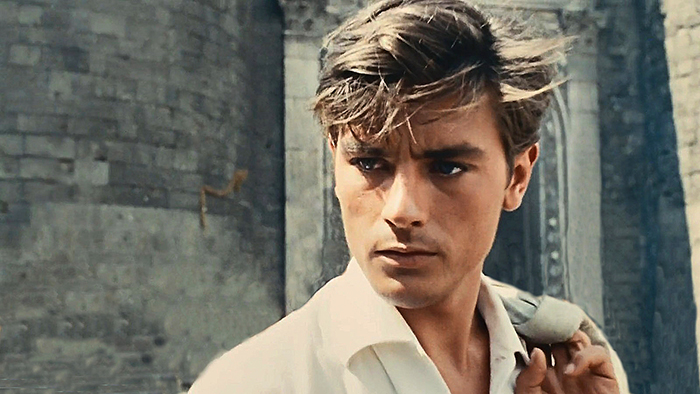
A Troubled Beginning: The Making of a Legend
Born Alain Fabien Maurice Marcel Delon on November 8, 1935, in Sceaux, France, he was far from destined for silver screen royalty. His early life was fractured as his parents divorced when he was four and he was raised between foster homes and relatives. By age 14, Delon had quit school and worked as a butcher’s apprentice. Then came military service in the French Navy during the First Indochina War. Even there, Delon’s refusal to conform led to nearly a year in a military prison and a dishonorable discharge. But it was precisely this blend of vulnerability and defiance that would one day fuel his magnetism. The man who would become synonymous with elegance and refinement came from brokenness and never truly left it behind.
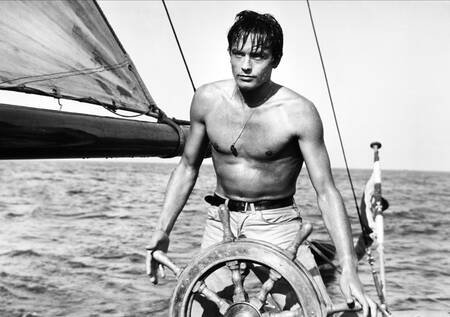
Purple Noon, 1960
The Ascent: From Outsider to Icon
Delon’s film career began as fortuitously as it was explosive. A chance trip to the Cannes Film Festival in 1957, where his unearthly beauty caught the eye of industry insiders, landed him a film role. His breakthrough came with Luchino Visconti’s Rocco and His Brothers (1960) and René Clément’s Purple Noon (1960), in which Delon portrayed Tom Ripley an ethereal con man with the eyes of a fallen angel and the heart of a predator.
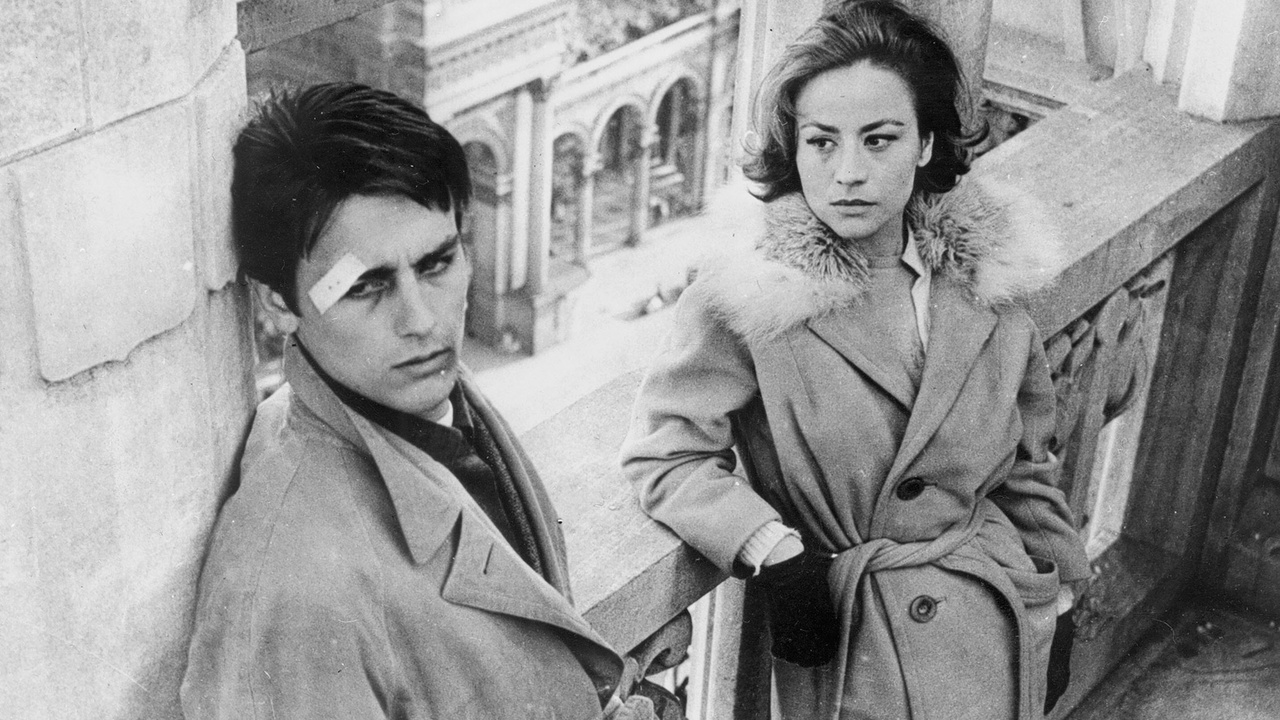
Rocco and His Brothers, 1960
These early roles established him not only as a captivating screen presence but as the prototype of a new kind of antihero elegant, deadly, and hauntingly beautiful. In Le Samouraï (1967) Delon reached cinematic immortality as the emotionless assassin Jeff Costello. Silent, calculating, with every movement choreographed like a ballet, Costello became the blueprint for cool in cinema. Delon didn’t just act, he embodied and in doing so, he revolutionized the way masculinity and mystery were portrayed on screen.
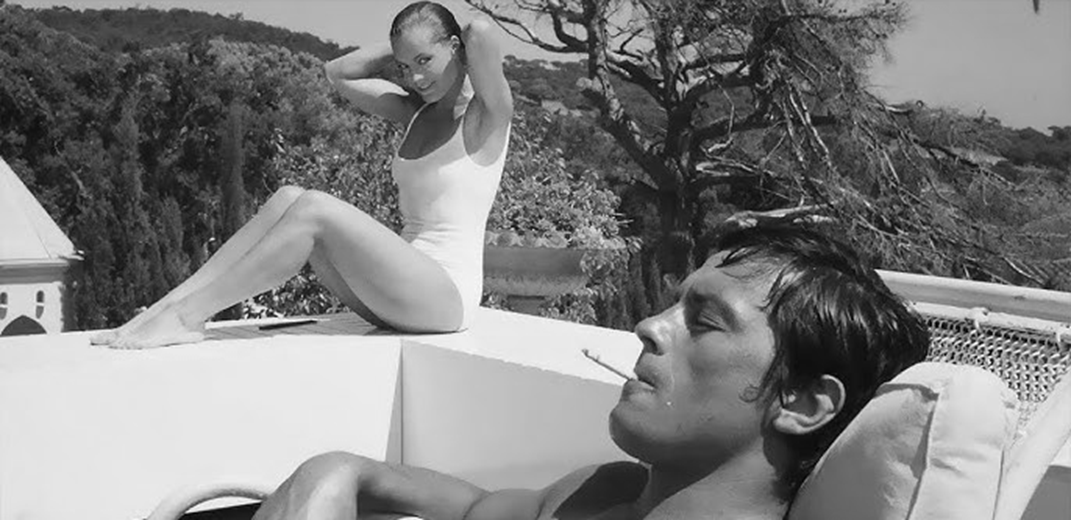
La Piscine, 1969
Global Stardom and Sophistication
Unlike his Hollywood contemporaries, Delon didn’t need to say much, his presence was enough. His androgynous allure, a symmetrical face sculpted like a Greek god and the enigmatic calm he exuded made him a muse for directors like Visconti, Antonioni, and Jean-Pierre Melville.
Delon’s popularity exploded across Europe and Asia, especially Japan where he was idolized. Films such as La Piscine (1969) and Le Cercle Rouge (1970) showcased his ability to pivot between icy detachment and smoldering intensity. No matter the role, Delon always played on his own terms. He was also fiercely entrepreneurial, establishing his production companies, Delbeau and Adel Film and later branching into perfumery and watches, each marked with his signature touch of sensual sophistication.
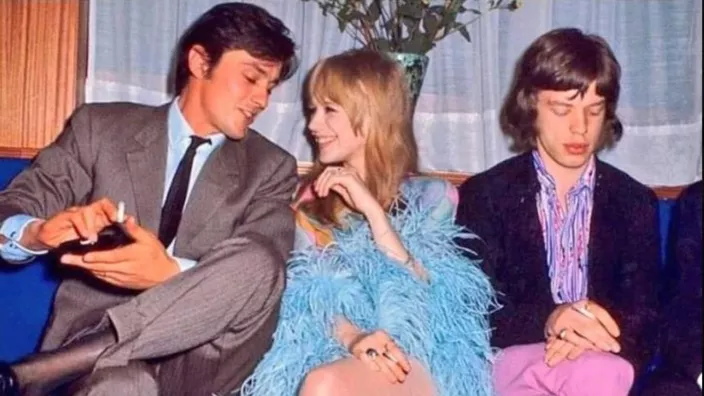 Alian Delon, Marianne Faithfull, and Mick Jagger
Alian Delon, Marianne Faithfull, and Mick Jagger
The Jagger-Faithfull Detour: A Rock Star Outclassed
In the 1960s, Mick Jagger was arguably the most famous man in the world, a swaggering symbol of sexual liberation. His romance with Marianne Faithfull, the ethereal chanteuse or female singer with a voice like velvet and a spirit like fire, was the very definition of Swinging London. Even Jagger, at the height of his powers, couldn’t hold a candle to the gravitational pull of Alain Delon.
Delon didn’t need to lift a finger, his allure, his silence, and his myth, was enough to shake one of the most iconic couples of the 20th century. Faithfull herself, in later interviews, would speak of Delon not with bitterness but awe. “He wasn’t a man, he was an atmosphere,” she once said. Jagger may have ruled the stage, but Delon owned the night. This wasn’t simply gossip. It was a cultural shift, a moment where cinematic elegance eclipsed rock-star swagger. And it proved that Delon’s brand of cool rooted in stillness, suggestion, and searing intelligence was beyond imitation.
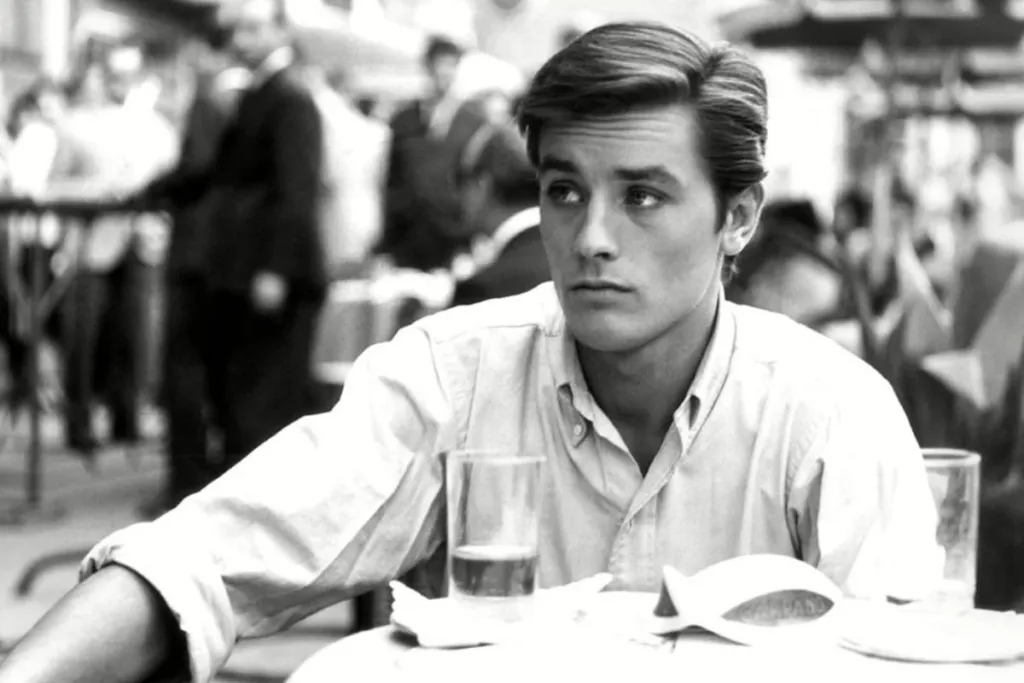
The Sartorial Spell: Fashion’s Silent Master
Delon’s sense of style was as iconic as his filmography. Crisp white shirts, slim trousers, loafers without socks, a cigarette dangling from impossibly full lips, he was the embodiment of Riviera chic. His fashion was minimalist but never plain, masculine but never brash. In Purple Noon and La Piscine, his linen-clad ease set a template that continues to influence men’s fashion decades later. Designers like Tom Ford have cited Delon as a muse, and his photographs still serve as mood boards for stylists and fashion houses worldwide. His elegance didn’t shout, it whispered. And it left an indelible echo.
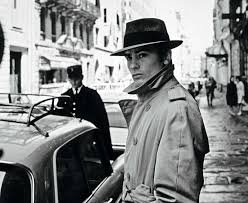
Le Samourai, 1967
A Collector of Art and Emotion
Delon’s aesthetic sensibility extended beyond cinema and fashion into art. He amassed a notable collection, Old Masters, contemporary paintings, and sculptures always with an intuitive, rather than academic, approach. He once said he only collected what “moved his soul.” This deeply personal connection to beauty informed every aspect of his being. Late in life, he auctioned off many pieces not out of necessity, but choice.
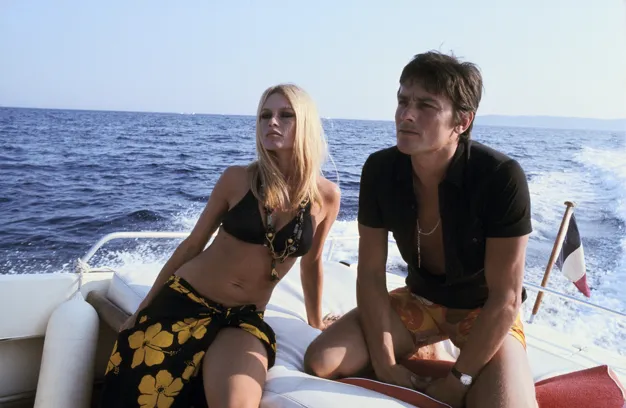
Bridgitte Bardot and Alain Delon in St. Topez 1970
Romance, Ruin, and Myth
Few leading men have lived their roles as fully as Delon did. His real-life romances were legendary, none more so than his doomed engagement to Romy Schneider. Their love story fierce, youthful, broken and never quite healed captivated Europe. Even after their split, the bond lingered. When Schneider died tragically young, Delon accompanied her body, laying a single rose and a handwritten note: “You will never leave my heart.”
He was married only once to Nathalie Delon, with whom he had a son, actor Anthony Delon. But his lovers were legions, Brigitte Bardot, Mireille Darc, and Dalida. Each affair added to the Delon mythos that of a man no one could truly possess. Yet behind the headlines was often loneliness. Delon admitted to bouts of depression, to a constant feeling of being hunted by his own image. “I don’t fear death,” he once said, “I fear not living true.”
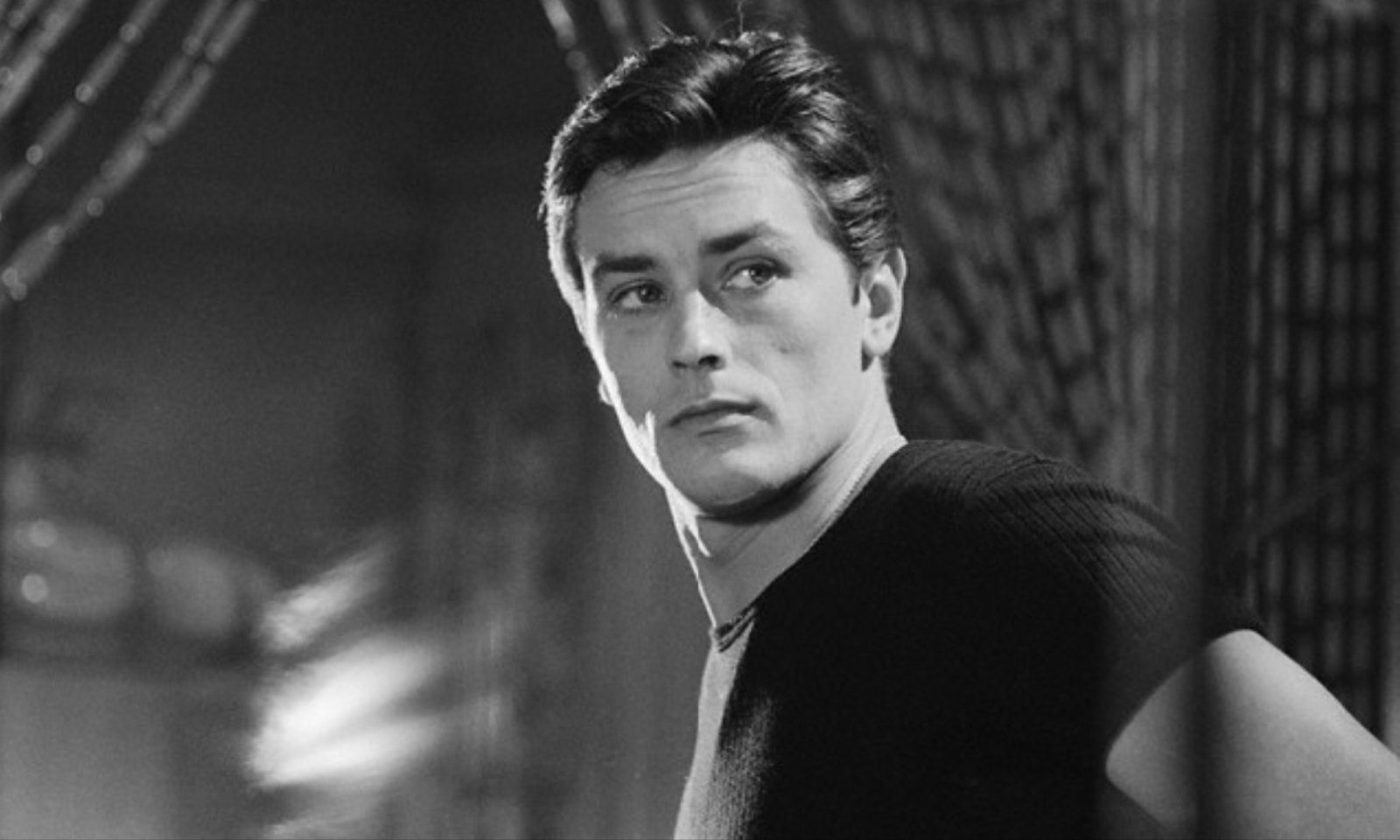
The Final Curtain
Alain Delon passed away peacefully at his country estate in Douchy on August 18, 2024. In death, as in life, he remained poised elegant, enigmatic, alone. His image survives not merely in photographs, but in the sartorial codes of every man who has ever stood in front of a mirror and tried, just for a moment, to capture that Delon cool. In the end, Delon was not merely an actor, a lover, a fashion icon; he was an atmosphere, an idea, and embodiment of a time when beauty was power, and mystery was its own form of rebellion.
Postscript: The Eternal Flame
In a world that consumes fame and forgets fast, Alain Delon endures. Because he never played for the crowd, never explained himself but rather in the stillness of a shot, with just a glance, he could suggest an entire world of danger, desire, and despair. The ultimate French seducer, the eternal antihero, and the beautiful enigma. Forever, Delon.
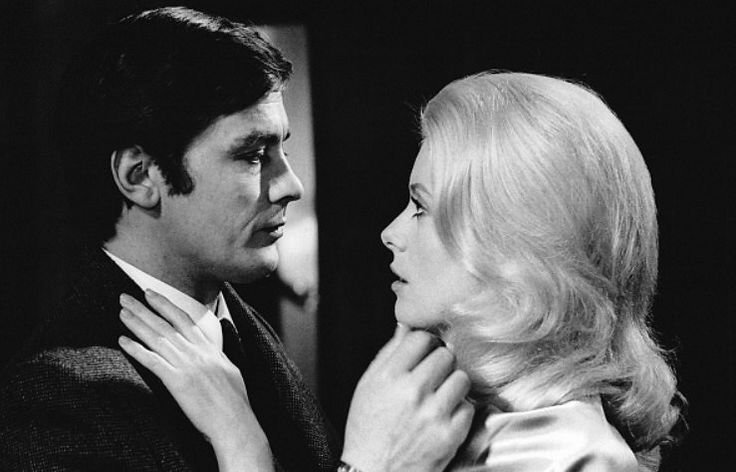
Un Flic, 1972, with Catherine Denueve
Addendum: Alain Delon Notable Movies
- Purple Noon, 1960Top of Form, crime thriller, with Maurice Ronet, Marie Laforet
- Rocco and His Brothers, 1960, crime drama, wih Renato Salvatori, Annie Giradot
- L’Eclisse, 1962, romantic drama, with Monica Vitti
- The Leopard, 1963, drama, with Burt Lancaster, Claudia Cardinale
- Any Number Can Win, 1963, crime thriller, with Jean Gabin
- The Last Adventure, 1967, adventure, with Lino Ventura
- Le Samourai, 1967, crime thriller, with Francois Parier, Natalie Delain
- La Piscine, 1969, crime thriller, with Romy Schneider
- The Sicilian Clan, 1969, crime drama, with Jean Gabin, Lino Ventura
- Le Cercle Rouge, 1970, crime thriller, with Yves Montand
- Borsalino, 1970, crime drama, with Jean Paul Belmondo
- Un Flic, 1972, crime thriller, with Catherine Deneuve, Richard Crenna
- Indian Summer, 1972, romantic drama, Giancarlo Giannini, Sonia Petrovia
- Scorpio, 1973, spy thriller, with Burt Lancaster
- Two Men In Town, 1973, crime drama, with Jean Gabin
- Le Gitan, 1975, crime drama, with Annie Girardot, Paul Meurisse
- Monsieur Klein, 1976, crime thriller, with Jeanne Moreau
- Death of a Corrupt Man, 1977, political thriller, with Ornella Muti
- Three Men to Kill, 1980, thriller, with Dalia D. Lazzaro
- Le Choc, 1982, crime thriller, with Catherine Deneuve
- Our History, 1984, romantic drama, with Natalie Baye
- Day and Night, 1997, romantic drama, with Lauren Bacall, Arielle Dombasle
Bottom of Form



